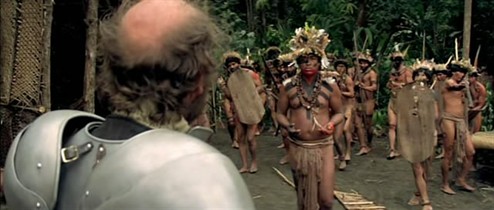
I started thinking about "El
Dorado" twenty years ago, after reading the novel "La aventura
equinocial de Lope de Aguirre", by Ramón J. Sender. At the time, I
neither had the strength nor the money to do a film like this, so I
discarded the idea of purchasing the literary rights. However,
subsequently I continued to think about the leading character (Lope
de Aguirre) because I found him fascinating [...]
The chroniclers and historians who
have written about Lope de Aguirre, narrate the same events. The
only thing that changes are the words they use to describe him.
Thus, some call him a madman, others a traitor or a criminal, the
tyrant, God's rage. Aguirre wants to have the necessary power to
become independent from Spain. It is an utopia, a brilliant
folly.
Imagine confronting Philip II, a
man so powerful that he virtually controlled the whole world!
Aguirre wants to create an
independent kingdom, which confers upon the expedition a sort of
magic. It is a wonderful story, though unreal and a bit
anarchistic. All that is missing is the epics of success; to have
achieved his goal. The Conquistadors were tough people. Life for
them had a different meaning. We stubbornly want to believe that we
were really great in those days. And it isn't true. It is about
time we acknowledged what we actually were in the past.
"El Dorado" is a story about a
civil war between Spaniards, a story about conquest in which
Spaniards kill each other. That is one of the things I find most
attractive about it. Perhaps I wouldn't have liked so much to do a
film in which the Spaniards confronted the Indians [...]
CARLOS SAURA